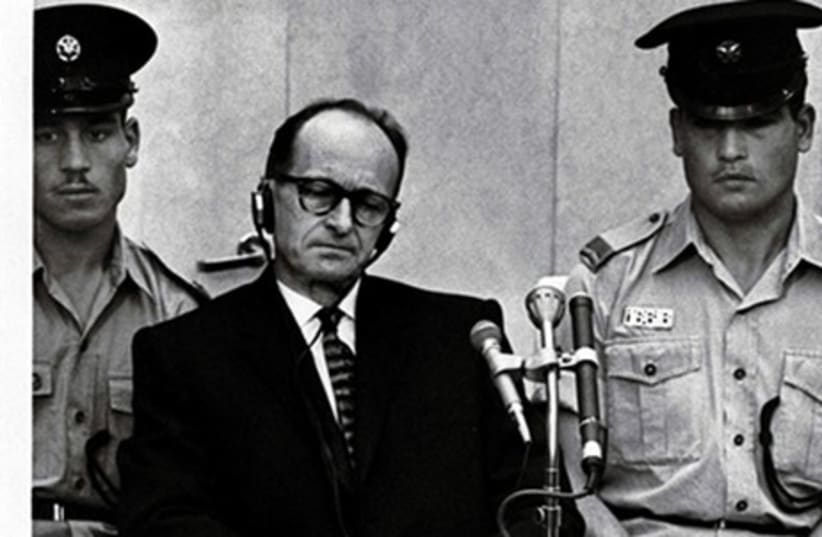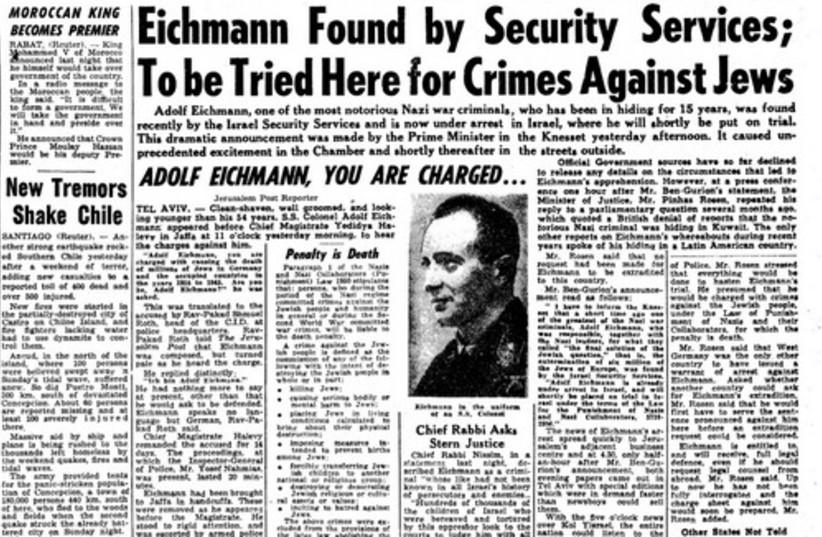INTERNATIONAL HOLOCAUST Remembrance Day was commemorated in different ways by different groups and organizations. Siblings Tami Raveh and Amos Hausner returned to Beit Ha’am, the place where their late father, Gideon Hausner, made history in April 1961 as chief prosecutor in the trial of Nazi officer Adolf Eichmann.
Eichmann was one of the major organizers of the Holocaust. His capture in Argentina and transportation to Israel have long been the subject of media reports and features, documentary films, radio programs and books. Raveh and Hausner, who, like their father, are lawyers, launched the latest book on the subject: When Eichmann Entered Our Home.
Among those present at the book launch were former president Reuven Rivlin and Mayor Moshe Lion. The Eichmann trial was one of the most meaningful and historically important events ever held in Jerusalem or in the State of Israel, said Lion, emphasizing that Hausner had not only represented the state but also the six million Jewish victims of the Nazis.
Gideon Hausner’s opening speech is considered to be among the most moving on record.
“When I stand before you here, judges of Israel, to lead the prosecution of Adolf Eichmann, I am not standing alone. With me are six million accusers. But they cannot rise to their feet and point an accusing finger towards him who sits in the dock and cry ‘I accuse,’ for their ashes are piled up on the hills of Auschwitz and the fields of Treblinka and strewn in the forests of Poland. Their graves are scattered throughout the length and breadth of Europe. Their blood cries out, but their voice is not heard. Therefore, I will be their spokesman, and in their name I will unfold the awesome indictment.”
■
THERE IS a tendency to ignore or to forget that the Holocaust is not just an Ashkenazi calamity. There were also North African Jews who were physically affected by the Holocaust. Nor is it just a Jewish tragedy. The victims included Romani and other minorities, and people with physical and mental disabilities. Among the North African Jews, there were also heroes who in one way or another resisted the Nazis.
It is important to mention this now because even on the most solemn days on the Jewish calendar, the ethnic genie tends to cast its disruptive spell.
Among the North African heroes was a woman who was also a trailblazer. Her name was Rachel Hélène Cazes Benatar, generally known as Nelly. Descended from Spanish Jews who settled in Tangier, Morocco, sometime in the 18th century, she was the first native-born Moroccan woman to earn a law degree.
She and her husband, Moyses Benatar, were prominent members of the Jewish community and active Zionists. She was also the president of WIZO, and in 1936 became the first woman to sit on the governing board of the Moroccan Zionist Congress. Tragedy struck when Moyses Benatar died at age 39, only two days after being diagnosed with an infection, leaving Nelly a young widow and the mother of two children. Though distraught for a long period of time, her organizational skills and sense of purpose returned in 1939, with the outbreak of the Second World War.
She joined the Red Cross and was scheduled to go on a mission to Europe, but that plan was thwarted due to France’s capitulation to Germany in June 1940.
Refugees were flooding into Morocco. Many were destitute Jews fleeing from Europe. In response to their needs, Rachel Cazes Benatar founded the Committee for Assistance to Refugees to provide them with shelter, food, medical help and travel assistance while in transit through Morocco.
The French Vichy regime, which collaborated with Nazi Germany, seized control of southern France and its colonies abroad. Jews were immediately listed as undesirables, which placed Benatar and the Jewish community of Morocco in immediate danger. Nonetheless, she continued assisting refugees to reach safe havens in the West, by joining forces with various Jewish rescue organizations, mostly in America, but also in Europe.
She also had close contacts with the French colonial administration, which officially cooperated with the Nazis but included highly placed defectors who secretly facilitated her work.
An all-day international conference held on Thursday of last week at the Ben-Zvi Institute on the eve of International Holocaust Remembrance Day was dedicated to Rachel Hélène Cazes Benatar, with various speakers focusing on different aspects of her life. The speakers included both Ashkenazim and Sephardim. Among the latter were Haim Cohen, chairman of the World Sephardi Federation; Prof. Haim Saadon, the CEO of the Center for Documenting the Jews of North Africa; and Prof. Yosef Shitrit of the University of Haifa.
■
HOLOCAUST SURVIVORS were also interviewed on several radio programs, among them Jerusalem-based artist Aviva Blum, 99, a survivor of the Warsaw Ghetto, who will soon have a joint exhibition with a Polish artist who turns black-and-white photographs from the Holocaust era into art, and colors the images. A Polish friend of Blum recognized her in one of the overpainted photographs. Blum subsequently made contact with the artist, who was very excited to learn that she was still alive and still painting, and suggested a joint exhibition. After it is held in Poland, it may possibly be shown at the Jerusalem Artists’ House.
■
TERRORISM IS an evil, regardless of the perpetrators or the victims. Taking the law into one’s own hands for whatever reason is tantamount to opening the door to vigilantism.
The request by Prime Minister Benjamin Netanyahu to refrain from such activity or any other form of violence has fallen on deaf ears, as has the warning by Shas leader MK Arye Deri that extreme measures against the families of Palestinian terrorists cannot be taken because Israel has other considerations in its relationship with other countries, particularly the United States. Violence is on the rise in Israel and is likely to be more so as increasing numbers of civilians apply for gun licenses.
Hagit Pe’er, the chairwoman of Na’amat, while acknowledging that army-trained civilians with gun permits and shooting expertise have neutralized some terrorists in the absence of law enforcement personnel, says that it is dangerous, given the level of violence that already exists in Israeli society, to bring a gun into the house. Domestic stabbings have been bad enough, but a gun can be even more lethal, she argues.
The source of some of the violence can be attributed to certain legislators who have been inciting against the media. Evidence of this was seen in Neveh Ya’acov last Saturday night, when young locals, who sounded like an extension of La Familia, kept shouting “Death to the Arabs” as they clustered around a KAN 11 broadcast team and physically attacked Udi Segal and Alon Ben-David , who are part of the Channel 13 news team.
greerfc@gmail.com

